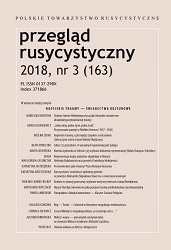Reprezentacje wojny radziecko-afgańskiej w filmach Aleksieja Bałabanowa oraz powieści Swietłany Aleksijewicz
Images Of Soviet-Afghan War in Films of Aleksei Balabanov and Novel of Svetlana Alexievich
Author(s): Beata Waligórska-OlejniczakSubject(s): Social Sciences, Literary Texts, Studies of Literature, Film / Cinema / Cinematography, Theory of Literature
Published by: Polskie Towarzystwo Rusycytyczne
Keywords: Alexei Balabanov;Russian cinema;war in cinema;war in literature;Svetlana Alexievich;Soviet-Afghan war
Summary/Abstract: The aim of the article is the interpretation of two films directed by Aleksei Balabanov, i.e. Cargo 200 and Stoker and the novel Boys in Zinc written by Svetlana Alexievich, from the point of view of representations of Soviet-Afghan war (1979–1989), contained in them. The methodological basis of the analysis constitutes the concept of the allegorical moment, which was worked out by Adam Lowenstein in his book Shocking Representation: Historical Trauma, National Cinema, and the Modern Horror Film. It is assumed that one of the most important rules governing the selected works of art is providing the viewer with the shocking image to replace and imitate the shock of the traumatic boundary experience. In this context the prose of the Nobel prize winner serves as a kind of voice-over, the documentary allowing us tounderstand and emphasize the meaning of Balabanov’s posttraumatic films.
Journal: Przegląd Rusycystyczny
- Issue Year: 2018
- Issue No: 163
- Page Range: 94-105
- Page Count: 12
- Language: Polish

